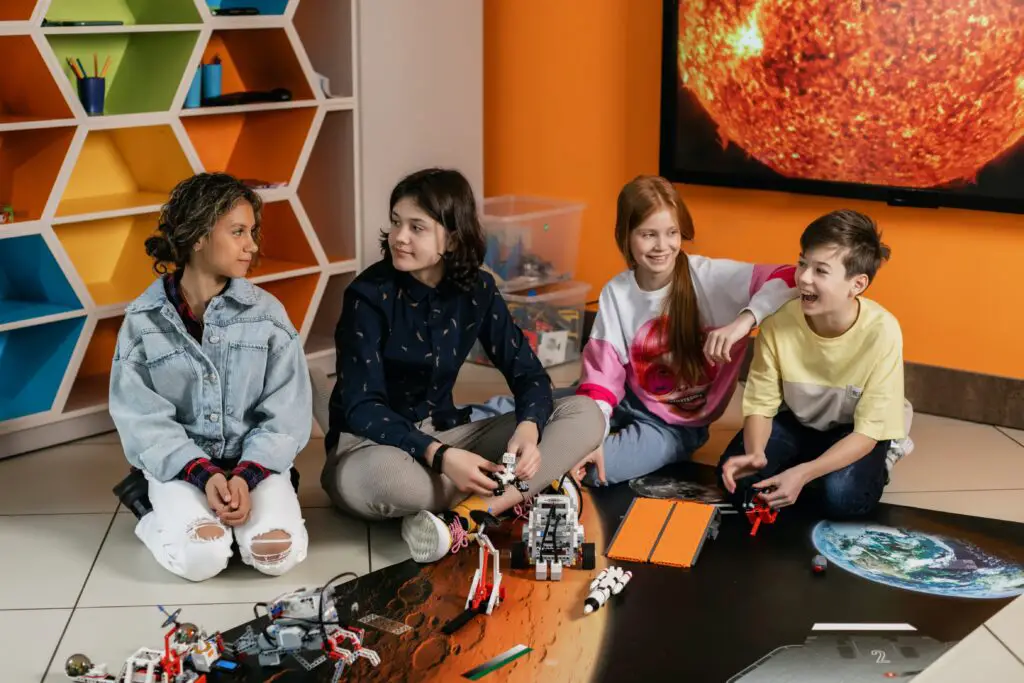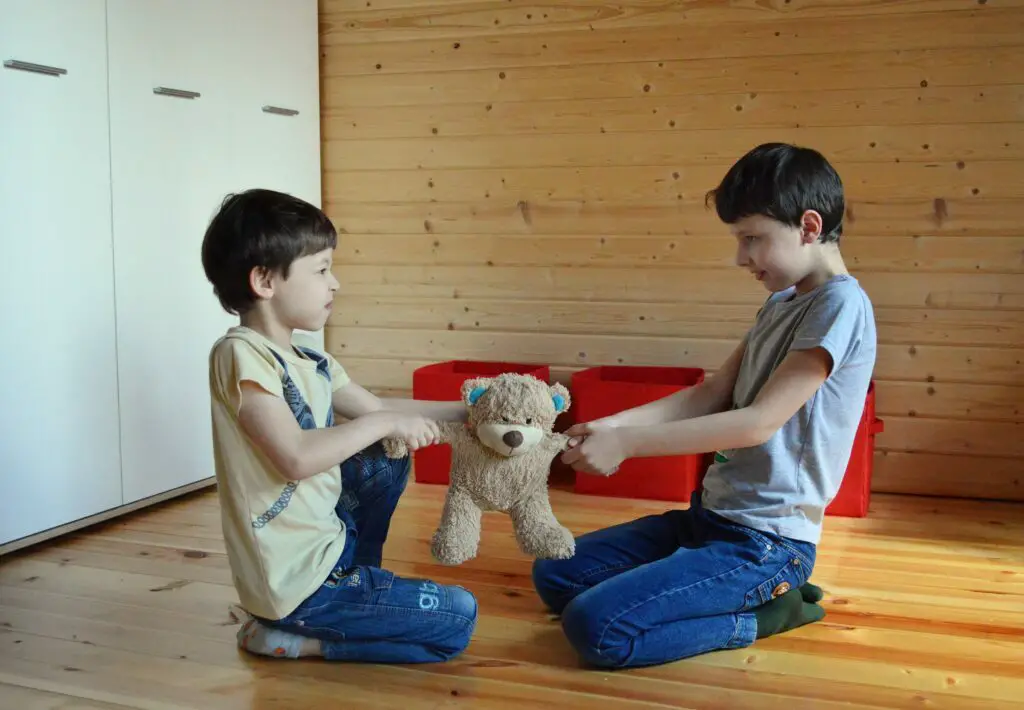As an experienced mother, I can confidently say that the journey of parenting is a remarkable rollercoaster ride filled with laughter, tears, and boundless love. From the first tender moments of holding my precious newborn in my arms to witnessing them grow into unique individuals, every step has been a cherished adventure.
Raising multiple kids has been an extraordinary and rewarding challenge, where no two days are ever the same. Through the ups and downs, I’ve learned valuable lessons about fostering strong sibling bonds, nurturing individuality, and finding the perfect balance between guidance and independence.
Every child is like a distinct puzzle piece, forming an unbreakable bond that weaves our family together. Join me as we explore time-tested tips for cultivating joyous and harmonious sibling relationships while embracing the beautiful chaos that comes with parenting multiple kids. Together, let’s embark on this heartwarming voyage of love, learning, and laughter!
Some of the links in this post are affiliate links. This means if you click on the link and purchase the item, I will receive an affiliate commision at no extra cost to you. All opinions remain my own. Read more on our Privacy Policy Page

Cultivating a Nurturing and Inclusive Family Environment
Prioritize Family Time and Shared Activities
Amidst the joys and challenges of parenting multiple kids, cultivating a nurturing and inclusive family environment takes center stage. Making a conscious effort to prioritize family time and engage in shared activities lays the groundwork for stronger family bonds. Whether it’s enjoying meals together, embarking on fun outings, or partaking in family game nights, these collective experiences create lasting memories and a sense of togetherness.
Foster Open Communication and Active Listening
In the tapestry of a loving family, fostering open communication and practicing active listening becomes a cornerstone of positive relationships. Encouraging each child to express their thoughts and feelings in a safe space cultivates trust and understanding. As parents, being attentive listeners and empathetic responders paves the way for healthy communication between siblings and promotes mutual respect.
Celebrate Each Child’s Uniqueness
Embracing the diversity within the family unit involves celebrating each child’s uniqueness and appreciating their individual contributions. Whether it’s academic achievements, artistic talents, or personal milestones, acknowledging and celebrating their successes nurtures their self-esteem and strengthens the sibling bond. By emphasizing their distinct qualities, parents foster an atmosphere of support and acceptance, creating a harmonious family dynamic.
Setting Clear Boundaries and Fair Discipline Strategies
Establishing Universal Household Rules
Maintaining a balanced and harmonious household while parenting multiple kids relies on establishing clear, universal boundaries. By implementing consistent household rules that apply to all children, a sense of fairness and unity prevails. When these rules are effectively communicated, children understand the expectations, promoting responsible behavior and a positive family environment.
Tailoring Consequences to Individual Development
An essential aspect of successful parenting is applying age-appropriate consequences when rules are broken, tailored to each child’s unique developmental stage. This approach ensures that disciplinary actions resonate with the child’s understanding, allowing parents to impart valuable life lessons without resorting to harsh punishments. By taking individual development into account, parents can guide their children’s growth in a nurturing and supportive manner.
As a mom to two wonderful kids, I firmly believe in setting clear boundaries and implementing fair discipline strategies. Together, we establish simple rules like finishing homework before playtime and using kind words. When they break the rules, consequences are consistent and appropriate for their ages. I make sure to praise and encourage their good behavior, treating them both equally to avoid any favoritism. Teaching them to resolve conflicts respectfully and involving them in rule-making empowers them to take responsibility. I strive to be consistent in enforcing these rules, as it creates a loving and nurturing environment for my children to grow.
Cultivating Equality and Embracing Uniqueness
In nurturing sibling relationships, it is crucial to embrace fairness and avoid favoritism in all interactions. Treating each child with equal love and respect is fundamental to building trust and fostering strong sibling bonds. By acknowledging and celebrating the individuality of each child without displaying favoritism, parents create an environment where every child feels valued and appreciated, contributing to a positive and supportive family dynamic.
Cultivating Strong Sibling Bonds and Teamwork

Foster Cooperation and Collaboration with Engaging Activities
Building close bonds among siblings in a bustling household of multiple kids entails organizing engaging activities that promote cooperation and collaboration. Participating in shared experiences cultivates a sense of togetherness and teamwork. From solving puzzles to engaging in creative projects, these memorable activities strengthen the sibling bond and create cherished memories.
Encourage Mutual Support and Assistance
As parents, encouraging siblings to support and help each other fosters a nurturing family environment. Cultivating empathy and compassion among siblings nurtures a culture of care and understanding. Whether it’s offering a helping hand with homework or being a listening ear, these acts of support create a strong sense of unity and solidarity among siblings.
Teach Conflict Resolution and Compromise
In the intricate web of sibling dynamics, it is vital to teach conflict resolution and compromise skills. Empowering children with these essential life skills enables them to navigate disagreements with empathy and understanding. By promoting open communication and collaborative problem-solving, parents create a constructive environment where conflicts are resolved harmoniously, further strengthening the sibling bond.
Embrace Each Child’s Uniqueness
Recognize Individual Strengths and Challenges
Appreciating the distinctiveness of each child is crucial in effective parenting. Understanding their unique strengths and challenges fosters a sense of individuality and self-worth. By acknowledging and supporting their diverse qualities, parents create an environment where each child feels valued and cherished.
Tailor Parenting Approaches to Personalities
Nurturing multiple kids involves adapting parenting approaches to suit their personalities. Recognizing their distinct needs and preferences enables parents to provide personalized guidance and support. By respecting their individuality, parents can nurture their growth and development effectively.
Encourage Pursuit of Personal Hobbies and Interests
Allowing space for personal hobbies and interests in each child’s life fosters a sense of autonomy and passion. Supporting their pursuits nurtures creativity and a well-rounded development. By giving them the freedom to explore their passions, parents encourage self-discovery and a lifelong love for learning.

Cultivate Strong Sibling Bonds and Individual Connection
Embrace Each Child’s Uniqueness
Recognizing the individuality of each child is essential for fostering strong sibling bonds. Understanding their unique strengths and challenges nurtures a sense of self-worth and belonging. By celebrating their distinct qualities, parents create an environment where each child feels valued and cherished.
Tailor Parenting to Personalities
Effective parenting involves adapting approaches to suit each child’s personality. Tailoring parenting strategies based on their needs and preferences provides personalized guidance and support. Respecting their individuality helps nurture their growth and development.
Encourage Personal Hobbies and Interests
Allowing space for personal hobbies and interests empowers children to explore their passions. Supporting their pursuits cultivates creativity and a well-rounded development. Encouraging self-discovery lays the foundation for a lifelong love of learning.
SIBLING BONDING GAMES AND ACTIVITIES
Foster Independence and Responsibility
Assign Age-Appropriate Responsibilities
Empowering children with age-appropriate responsibilities fosters independence and accountability. Simple household tasks and personal chores instill essential life skills and a sense of pride in contributing to the family.
Promote Sibling Mentorship
Encouraging older siblings to mentor and guide their younger counterparts nurtures a supportive relationship. This fosters a sense of responsibility and leadership in older siblings, while younger ones benefit from a nurturing and trusting environment.
Instill Accountability for Actions
Fostering responsible individuals involves instilling a sense of accountability in each child for their actions. Encouraging them to take ownership of their choices promotes self-reflection and personal growth.

Strengthen Family Unity Through Meetings
Hold Regular Family Meetings
Conducting regular family meetings provides a platform for open communication and collective decision-making. This fosters a sense of unity and teamwork within the family.
Empower Children’s Voices
Family meetings offer an opportunity for each child to express their thoughts and feelings in a safe and non-judgmental space. Valuing their opinions ensures that every family member feels heard and valued.
Collaborate on Solutions
In times of challenges or decisions, involving the entire family helps create a sense of ownership and responsibility. Collaborating on solutions as a family promotes mutual respect and strengthens bonds.
Manage Time and Prioritize Self-Care
Create a Balanced Schedule
Creating a balanced schedule that accommodates each child’s needs is essential for efficient parenting. Balancing school, extracurricular activities, and family time ensures that each child receives ample attention and support.
Allocate Time for Self-Care
Taking time for relaxation and self-care is vital for parents amidst their responsibilities. Prioritizing self-care enables them to recharge, reducing stress and enhancing their ability to be present and nurturing.
Seek Support When Needed
Raising multiple kids can be demanding, and seeking support from family and friends during challenging times is beneficial. A strong support system provides a listening ear and understanding during both joys and struggles.
SIBLING BONDING GAMES AND ACTIVITIES
Embrace the Unpredictable Nature of Parenting

Parenting multiple kids can be dynamic and unpredictable, but embracing the uncertainties with an open mind helps navigate the ever-changing terrain of parenthood.
Adjust Parenting Strategies as Children Grow
Being willing to adjust parenting strategies as children grow and develop allows for effective guidance throughout their various stages of life.
Maintain a Positive and Flexible Mindset
Approaching the parenting journey with a positive and flexible mindset fosters resilience and optimism during challenging moments.
How to Maintain a Positive and Flexible Mindset?
To foster a positive and flexible mindset, consider incorporating these strategies into your daily life:
- Cultivate Gratitude: Regularly acknowledge and appreciate the positive aspects of your life, big or small. Practicing gratitude shifts your perspective towards a more positive outlook.
- Embrace Change: View change as an opportunity for growth and learning rather than something to fear. Embrace it with curiosity and an open mind to discover new experiences.
- Practice Mindfulness: Stay present in the moment and avoid dwelling on the past or worrying about the future. Embracing the present helps you adapt to new situations with flexibility.
- Challenge Negative Thoughts: Be aware of negative thoughts and reframe them in a positive and constructive manner. This fosters a solution-oriented mindset.
- Seek Perspective: Talk to others about your challenges and seek different viewpoints. This broadens your understanding and inspires new ideas.
- Maintain Balance: Prioritize self-care and strike a healthy work-life balance. A well-balanced lifestyle contributes to a positive and adaptable mindset.
- Learn from Setbacks: View setbacks as opportunities to learn and grow. Analyze what went wrong, identify lessons, and use this knowledge to improve future outcomes.
- Set Realistic Goals: Break down achievable goals into manageable steps. Celebrate progress to boost motivation and reinforce positivity.
- Practice Self-Compassion: Treat yourself with kindness and understanding, just as you would a friend. Embrace imperfections and learn from mistakes.
- Surround Yourself with Positivity: Engage with uplifting content, inspirational quotes, and supportive people. Positive influences can shape your mindset significantly.
Maintaining a positive and flexible mindset is a continuous journey that requires self-awareness and effort. By integrating these practices into your life, you can approach challenges with courage and optimism, adapting to life’s uncertainties with grace.
Foster Harmonious Sibling Relationships
Sibling rivalry is natural, but being mindful of its signs and addressing them promptly helps maintain a harmonious environment.
Teach Conflict Resolution
Teaching children conflict resolution skills empowers them to manage disagreements constructively, promoting healthy communication and cooperation.

How to teach conflict resolution?
- Encourage active listening: Teach the importance of listening attentively to others during conflicts to understand their perspectives fully.
- Promote empathy: Help children put themselves in others’ shoes to understand their feelings and experiences better.
- Use “I” statements: Teach children to express their feelings and needs using “I” statements instead of blaming or accusing language.
- Identify common goals: Encourage finding common ground and shared objectives to work towards a mutually agreeable solution.
- Brainstorm solutions: Encourage children to come up with multiple possible solutions to the conflict, fostering creativity and open-mindedness.
- Evaluate consequences: Discuss the potential outcomes of each solution and their impact on both parties involved.
- Choose the best resolution: Collaboratively select the most appropriate solution that addresses the needs and concerns of all parties involved.
- Practice assertiveness: Teach children to express their needs and boundaries confidently without being aggressive or passive.
- Respect personal space: Emphasize the importance of giving each other space when emotions are high, allowing time to cool down before addressing the conflict.
- Model conflict resolution: Demonstrate healthy conflict resolution techniques in your interactions with others, serving as a positive role model for your children.
Promote Healthy Competition and Cooperation
Encouraging healthy competition and cooperation between siblings strengthens their bond and cultivates mutual respect.
SIBLING BONDING GAMES AND ACTIVITIES
Celebrate Each Child’s Achievements and Milestones
Let’s say you have two children, Lily and Ethan. Lily is 12 years old and has just won a school art competition, while Ethan, who is 8 years old, recently learned to ride his bike without training wheels. As a parent, you can celebrate each child’s achievements and milestones in the following ways:
- Personal Recognition: Take the time to personally acknowledge and praise Lily’s artwork and Ethan’s bike-riding accomplishment. Sit down with each child individually and express how proud you are of their achievements.
- Display their Accomplishments: Proudly display Lily’s winning artwork in a prominent place at home. Hang Ethan’s picture with his bike or a certificate of achievement in his room. This shows them that their accomplishments are valued and celebrated.
- Family Celebration: Organize a small family celebration to honor each child’s achievement. It could be a special dinner where they get to choose their favorite meal or a fun outing to a park or an amusement center.
- Capture the Moment: Take photos of Lily with her winning artwork and Ethan with his bike. These pictures will be treasured memories for both of them and a reminder of their achievements.
- Celebrate with Siblings: Involve siblings in the celebration too. Encourage them to congratulate and cheer on their sister or brother, reinforcing a sense of support and camaraderie among the siblings.
- Share the News with Extended Family: Inform grandparents, aunts, uncles, and cousins about Lily and Ethan’s achievements. Sharing the news with extended family will bring even more joy and positive reinforcement.
- Create a Keepsake: Consider creating a keepsake for each child to commemorate their achievements. For example, frame Lily’s winning artwork or create a scrapbook page with a photo of Ethan and his bike.
- Encourage Self-Reflection: Ask each child to reflect on their achievement and how they feel about it. This helps them internalize their success and boosts their confidence.
- Encourage Future Goals: Encourage both Lily and Ethan to set new goals for themselves based on their achievements. This fosters a sense of ambition and growth.
- Support Ongoing Efforts: Remind them that their achievements are a result of their hard work and dedication. Encourage them to continue pursuing their passions and interests.
By celebrating each child’s achievements and milestones, you reinforce their self-worth, boost their self-esteem, and create a positive and encouraging atmosphere at home. Your support and acknowledgment will motivate them to continue striving for success in the future.

Conclusion
In the rewarding journey of parenting multiple kids, embracing these essential tips for parents can make all the difference.
Setting clear boundaries, fostering sibling bonds, encouraging independence, and maintaining a positive mindset create a nurturing family environment.
By celebrating each child’s achievements and milestones, we lay the foundation for a loving and supportive family.
So, let’s embark on this adventure with love, patience, and the determination to create cherished memories and thriving relationships with our beloved children.
Together, we can navigate parenthood with confidence and joy!
SIBLING BONDING GAMES AND ACTIVITIES







Pingback: How to Resolve and Prevent Sibling Conflict: Tips for Nurturing Stronger Bonds - SiblingVibes